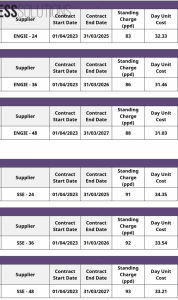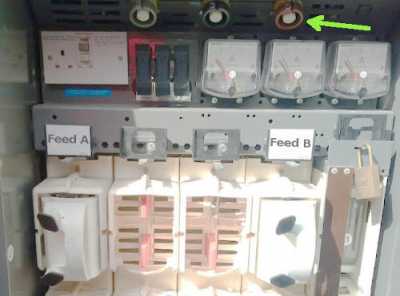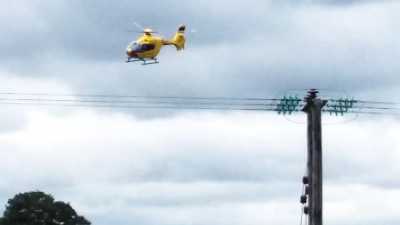I'm currently on at 2 yr fixed (Feb 2022 - Feb 2024) tariff at 34p per kWh electricity from EDF. Slightly above the present price cap.
Just took a look at long term fixed price quotes on their website. Now 61p per kWh for a fix from now ending in Feb 2024.
The next price cap fix in October will be the last staw for many people.
Mike
Grant Aerona HPID10 10kWh ASHP
That’s really interesting thanks for sharing. Just had a quick look at octopus go which is my current tariff (12m fix) 40.9p 7.5p low rate and 51.36p standing charge
I was thinking that electricity would be low-mid 30’s when cap goes up but that’s looking optimistic.
At work, we're currently on 15p till March '23 - we've just signed on for a 3yr to run till march '26 @ 27p (both ex vat)
Off grid on the isle of purbeck
2.4kW solar, 15kWh Seplos Mason, Outback power systems 3kW inverter/charger, solid fuel heating with air/air for shoulder months, 10 acres of heathland/woods.
My wife’s house: 1946 3 bed end of terrace in Somerset, ASHP with rads + UFH, triple glazed, retrofit IWI in troublesome rooms, small rear extension.
Posted by: @hughfAt work, we're currently on 15p till March '23 - we've just signed on for a 3yr to run till march '26 @ 27p (both ex vat)
Maybe a good indication of the likely price in the coming years. I'm surprised it's that low.
Found the quotes we were given, pretty sure my Boss said these were inc vat but we get the vat back obvs... This was through a broker, EC Business Energy solutions. I think we went with the 36 months from Engie (French supplier)
Off grid on the isle of purbeck
2.4kW solar, 15kWh Seplos Mason, Outback power systems 3kW inverter/charger, solid fuel heating with air/air for shoulder months, 10 acres of heathland/woods.
My wife’s house: 1946 3 bed end of terrace in Somerset, ASHP with rads + UFH, triple glazed, retrofit IWI in troublesome rooms, small rear extension.
There is also the CCL which is paid by business but not domestic users
https://www.gov.uk/guidance/climate-change-levy-rates
Also the VAT on business energy is 20% but on domestic energy it is 5%
EV charging away from home is also 20% VAT.
Business energy can be cheaper due to economies of scale and also how well you negotiate as two companies can end up paying different rates in the same street from the same supplier.
For domestic customers it is unusual to see over 24 month contracts.
Wholesale prices have been volatile generally in the last few weeks so the business may have been lucky getting a quote at a good time.
If the controlled blackouts are introduced I wonder how long they will be? Long enough for heat to escape the property, and for the heat pump to take 24 hours to catch. This could be tricky.
https://apple.news/A7ox8pmLQQDKjbR0HDmPeKw
Get a copy of The Ultimate Guide to Heat Pumps
Subscribe and follow our YouTube channel!
Posted by: @kev-mPosted by: @transparentPosted by: @kev-mthe consequences of a catastrophic grid failure are not really anything to do with domestic heating.
I think most properties would struggle to maintain domestic heating in the absence of electricity from the grid ! 😲
I'm not sure that I've properly understood your comment. Are you thinking that this isn't a suitable/relevant discussion for this forum?
My own heating could now continue to operate during an outage because I'm implementing off-grid storage. But we really do need to consider the resilience of future domestic heating systems.
Resilience a live discussion point with my (Borough) Council, who are also the Local Planning Authority. The increasing proportion of standing charges is constraining the sort of houses we'd want to see being built in future. There are a number of enterprising possibilities, particularly in this geographical area which has abundant renewable energy assets. Amongst these are:-
- Combined Heat & Power plant (CHP) within a multi-fuel energy hub, serving a cluster of 6-20 homes
- Using excess solar/wind generation to split water, and feed the resulting hydrogen either to the grid or to area-wide CHPs
Hydrogen production has greater short-term financial viability than the cost of upgrading the electricity grid. It avoids paying compensation to renewable-energy producers when they are required to reduce generation, and gas costs very little to transport.
All I was saying is that if the electricity grid failed, domestic heating would be the least of our worries and, as you say, gas CH systems wouldn't work anyway.
We saw what happened last Autumn with Storm Arwen and others where people we in houses with no electricity and no heating for weeks. I still have the Gas boiler in place and this is why hybrid systems, if any, are best for those installing Heat Pumps in that the Boiler remains available.
Watching those people freezing on TV when a simple fix could get them basic power and heating. A gas boiler so long as it has a source of power of around 90watts and fuel to burn, can run.
A simple Generator Transfer switch fitted to a property along with a Commando socket outside would allow a 2kwh or 3kwh Inverter Generator @ £300 to be connected, switched over and run to give basic power to a property and heating.
Although I have batteries, my property has an external socket and transfer switch for exactly this purpose, should battery be flat, I can quickly and easily switch to Generator.
As for boiler Fuel, there are 5x 47kg LPG cylinders at the side of my house and an LPG conversion kit for the boiler on stand-by. If it looks like Gas is going to be an issue, I will have the boiler converted to LPG and never connect it back to mains supply. Most of the year Solar is heating the house via Mini Split A2A and portable oil heaters and rarely do I need to run the boiler and if so, nearly always for less than half an hour. With supplemental heating and plan for Hot Water from Solar most of the year, 5x cylinders should easily keep us going.
Consider installing a Transfer Switch now and this should be standard fit on any re-wire in that Auxiliary power can be quickly provided, but hey, no one plans for bad days.
This is the biggest reason I refuse to completely electrify my heating.. too much reliance on Grid and a large Generator would be inherently expensive to purchase and run to provide power demand for heating.
Failing that, get yourself a Calor gas heater and a couple of 15kg cylinders - just in case - although I also have one of these in the garage as last resort.
We seriously need to start planning for the worst this winter..
Posted by: @diverted-energymy property has an external socket and transfer switch for exactly this purpose, should battery be flat, I can quickly and easily switch to Generator.
In my region Western Power has taken this approach. It's probably widespread practice.
The local substations have circular connection ports for a 3-phase generator to be connected in the event of a grid outage. Arrowed in photo:
I'm sure they'd use batteries if they could, but DNOs are forbidden from owning storage or generation assets.
Save energy... recycle electrons!
The latest quarterly Ofgem consumer survey report is out. It doesn’t look good. Over 50% of households say they are going to struggle to pay their energy bills. The heat or eat debate will be more important than ever, and at this point sustainability will go out the window. It’s not a good situation at all.
https://www.ofgem.gov.uk/publications/consumer-perceptions-energy-market-q1-2022
Get a copy of The Ultimate Guide to Heat Pumps
Subscribe and follow our YouTube channel!
@transparent only one problem..
They'll never supply the generator!!
Not sure what the point is, every substation has a generator input studs.
They are only used for planned outages. Not major storm damage.
Rely only on oneself..
Posted by: @diverted-energyThey'll never supply the generator!!
Not sure what the point is, every substation has a generator input studs.
They are only used for planned outages. Not major storm damage.
What DNO Region are you in @diverted-energy?
I'm one of the community-based members of the Open-LV project which monitors 'smart' substations. After an initial 12-months funding from Ofgem, the commercial and academic trials ceased, but Western Power took over the funding the community programmes because we continue to provide valuable insights and strategies.
Not all local substations (11kV) in my region have generator-inputs. But they are a requirement for all transformer replacements/upgrades.
The generator connections are used in my area to cope with storm damage/outages.
I live on the northern boundary of a rural area in Devon which is well known for its potential for trees bringing down power-lines. The local Network Engineering Team is very proactive in such circumstances and will bring in generators whilst repairs are underway. In the summer months they continue to do extensive line-survey work to gradually minimise the occurrence of such damage. Here they are next to my house recently at the start of a 33kV cross-country inspection run:
The DNOs are required by their Ofgem Licences to become Distribution System Operators (DSO). They must now become interactive within their region to better facilitate customers' needs and incorporate import/export of renewable micro-generation (ie below 50MW, and handled under G99 certification). The days of sitting back and maintaining a passive distribution network are over.
If your region isn't yet experiencing the benefits of the move towards DSO operation, then now is the time to open up a dialogue and find out what provisions they are planning to reduce repair-times during storm outages.
Save energy... recycle electrons!
- 27 Forums
- 2,495 Topics
- 57.8 K Posts
- 818 Online
- 6,220 Members
Join Us!
Worth Watching
Latest Posts
-

RE: Humidity, or lack thereof... is my heat pump making rooms drier?
That’s my pleasure, @andrewj. The only challenge now is...
By Majordennisbloodnok , 6 hours ago
-
RE: Electricity price predictions
@toodles @skd Then there is not going to be much from t...
By ChandyKris , 7 hours ago
-
RE: Solis inverters S6-EH1P: pros and cons and battery options
@batpred I reckon Andy might know a thing or 2 about...
By Bash , 7 hours ago
-
RE: What determines the SOC of a battery?
@batpred Ironically you didn't have anything good to...
By Bash , 8 hours ago
-
RE: Testing new controls/monitoring for Midea Clone ASHP
Here’s a current graph showing a bit more info. The set...
By benson , 8 hours ago
-
RE: Setback savings - fact or fiction?
True there is a variation but importantly it's understa...
By RobS , 8 hours ago
-

Below is a better quality image. Does that contain all ...
By trebor12345 , 9 hours ago
-
Sorry to bounce your thread. To put to bed some concern...
By L8Again , 9 hours ago
-

@painter26 — they (the analogue gauges) are subtly diff...
By cathodeRay , 9 hours ago
-
Our Experience installing a heat pump into a Grade 2 Listed stone house
First want to thank everybody who has contributed to th...
By Travellingwave , 13 hours ago
-
RE: Struggling to get CoP above 3 with 6 kw Ecodan ASHP
Welcome to the forums.I assume that you're getting the ...
By Sheriff Fatman , 16 hours ago
-
RE: Say hello and introduce yourself
@editor @kev1964-irl This discussion might be best had ...
By GC61 , 18 hours ago
-

RE: Oversized 10.5kW Grant Aerona Heat Pump on Microbore Pipes and Undersized Rads
@uknick TBH if I were taking the floor up ...
By JamesPa , 1 day ago
-

RE: Getting ready for export with a BESS
I would have not got it if it was that tight
By Batpred , 1 day ago
-
RE: Need help maximising COP of 3.5kW Valiant Aerotherm heat pump
@judith thanks Judith. Confirmation appreciated. The ...
By DavidB , 2 days ago
-

RE: Recommended home battery inverters + regulatory matters - help requested
That makes sense. I thought better to comment in this t...
By Batpred , 2 days ago
-
Bosch CS5800i 7kW replacing Greenstar Junior 28i
My heat pump journey began a couple of years ago when I...
By Slartibartfast , 2 days ago
-

RE: How to control DHW with Honeywell EvoHome on Trianco ActiveAir 5 kW ASHP
The last photo is defrost for sure (or cooling, but pre...
By JamesPa , 2 days ago
-

RE: Plug and play solar. Thoughts?
Essentially, this just needed legislation. In Germany t...
By Batpred , 2 days ago
-
RE: A Smarter Smart Controller from Homely?
@toodles Intentional opening of any warranty “can of wo...
By Papahuhu , 2 days ago
-
RE: Safety update; RCBOs supplying inverters or storage batteries
Thanks @transparent Thankyou for your advic...
By Bash , 2 days ago
-
RE: Air source heat pump roll call – what heat pump brand and model do you have?
Forum Handle: Odd_LionManufacturer: SamsungModel: Samsu...
By Odd_Lion , 2 days ago
-
RE: Configuring third party dongle for Ecodan local control
Well, it was mentioned before in the early pos...
By F1p , 2 days ago







